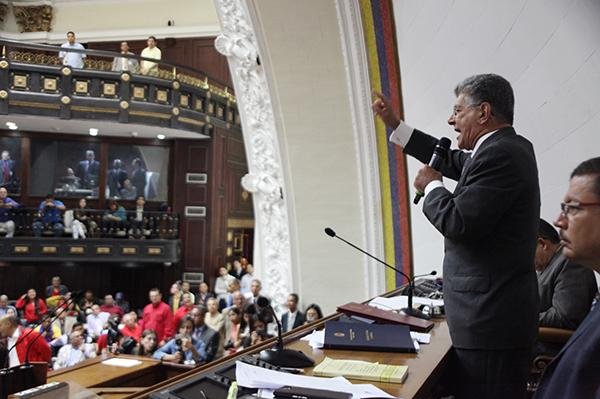Henry Ramos Allup, leader of Venezuela's National Assembly, said a criminal trial against President Nicolas Maduro would be delayed in the interest of peace negotiations. Photo courtesy of National Assembly
CARACAS, Venezuela, Nov. 2 (UPI) -- Venezuela's National Assembly has delayed a symbolic criminal trial against President Nicolas Maduro to ease tension amid political crisis talks.
Henry Ramos Allup, leader of Venezuela's legislature, said Tuesday's trial -- in which Maduro would be accused of staging a coup d'etat -- would be delayed to ease Venezuela's political crisis, particularly after Maduro's regime released five politicians Monday the opposition considered political prisoners.
The trial was dismissed by Maduro as invalid and his vice president, Aristobulo Isturiz, said the unicameral legislature "legally ... does not exist" due to a Venezuelan supreme court ruling that largely annuls parliamentary actions.
A protest against Maduro's regime led by the Democratic Unity Roundtable, or MUD, opposition coalition scheduled for Thursday that was to descend onto the presidential Miraflores Palace has also been delayed.
Maduro's regime has maintained there is no alternative other than dialogue to resolve Venezuela's political crisis, which has been exacerbated by deepening economic crisis. The opposition, though previously reluctant to hold talks with Maduro, accepted negotiations with the ruling government due to the involvement by the Vatican and other mediators.
MUD leader Jesus "Chuo" Torrealba on Tuesday accused Maduro of attempting to divide the opposition by calling some opposition members willing to negotiate as "dialogue partners," while calling others critical of the Vatican-mediated political-crisis negotiations as "radical."
The opposition, which controls the National Assembly, accuses Venezuela's institutions of making decisions to keep Maduro's socialist regime in power, while Maduro's regime accuses the opposition of undermining democracy by working with pro-capitalist companies and international actors, including the United States, to destabilize his government and the economy.















